Overview
To prepare for leaving a stable job for entrepreneurship, individuals should assess their motivations, skills, and risk tolerance, while also developing a financial plan and building a supportive network. The article emphasizes that a structured self-assessment and strategic planning can significantly enhance one’s readiness for the challenges of entrepreneurship, as well as the importance of maintaining professional relationships during the transition.
Introduction
Embarking on the journey of entrepreneurship is both exhilarating and daunting, especially for those transitioning from stable employment. As the landscape of work evolves, an increasing number of individuals are contemplating this leap, driven by diverse motivations ranging from financial independence to a longing for personal fulfillment.
However, before diving headfirst into this new venture, it’s essential to undertake a thorough self-assessment to gauge readiness. This article provides a comprehensive guide to navigating the multifaceted challenges of entrepreneurship, from evaluating personal motivations and financial planning to validating business ideas and managing emotional hurdles.
By following these structured steps, aspiring entrepreneurs can confidently prepare for a successful transition, laying the groundwork for a fulfilling and sustainable career in business ownership.
Assessing Your Readiness for Entrepreneurship
To effectively assess your readiness for entrepreneurship, consider how to prepare to leave a stable job for entrepreneurship by following these essential steps:
-
Identify Your Motivations:
Begin by reflecting on your reasons for leaving a stable job. Are you driven by a desire for independence, the potential for financial gain, or a passion for a particular field?
Understanding your motivations is crucial, particularly when learning how to prepare for leaving a stable job for entrepreneurship, as recent studies indicate that about 40% of traditionally employed Americans are contemplating this path. This trend is notably higher among younger and more educated individuals, highlighting the diverse motivations that can influence your decision. Additionally, consider the emotional drive to be re-energized and passionate about your work, which can be a significant factor in your business journey.
-
Evaluate Your Skills:
Compile a list of your strengths and transferable skills relevant to your new venture. Key business skills such as leadership, problem-solving, and creativity play a pivotal role in your success. It’s essential to recognize that many individuals possess strong transferable skills and a record of accomplishments that can facilitate a successful transition.
According to Graham Isador, the average business owner earns around $64,000 annually, showcasing the potential economic viability of your business endeavors. However, keep in mind the declining value of savings and investments, which underscores the importance of building wealth and equity as you embark on this path.
-
Consider Your Risk Tolerance:
Entrepreneurship inherently involves a degree of uncertainty.
Assess how comfortable you are with taking risks and managing potential setbacks. Recognizing your risk tolerance can guide your decision-making and preparation for the entrepreneurial landscape, especially in a declining career economy where jobs are increasingly short-lived, which is essential for understanding how to prepare to leave a stable job for entrepreneurship.
-
Conduct a SWOT Analysis:
Perform a thorough analysis of your Strengths, Weaknesses, Opportunities, and Threats.
This framework will provide you with a comprehensive view of your personal and market situation, helping you to identify areas where you can thrive and those that may require additional focus. A strong community and peer support can enhance this process, offering insights into your strengths and potential challenges.
-
Seek Feedback:
Engage with trusted colleagues or mentors to discuss your aspirations and gather their insights regarding your readiness.
Their feedback can offer valuable perspectives that you might not have considered, enhancing your self-assessment process. Building a supportive network is crucial for career transitioners aiming for financial independence and lifestyle fulfillment.
-
Understand the Market Landscape:
Recognize that advertising accounts for just 1% of the average business’s revenue, with 55% of businesses utilizing social media for advertising.
This insight can be crucial as you plan your marketing strategies and understand the potential avenues for reaching your target audience, particularly when considering how to prepare to leave a stable job for entrepreneurship.
By following this structured self-assessment, you will gain clarity on whether you are prepared to embark on the dynamic journey of entrepreneurship. As you navigate this path, keep in mind the importance of personal agency and community engagement, as well as the fact that 60% of solopreneurs are planning to hire at least one employee or contractor in 2024, indicating a significant trend towards building scalable ventures.
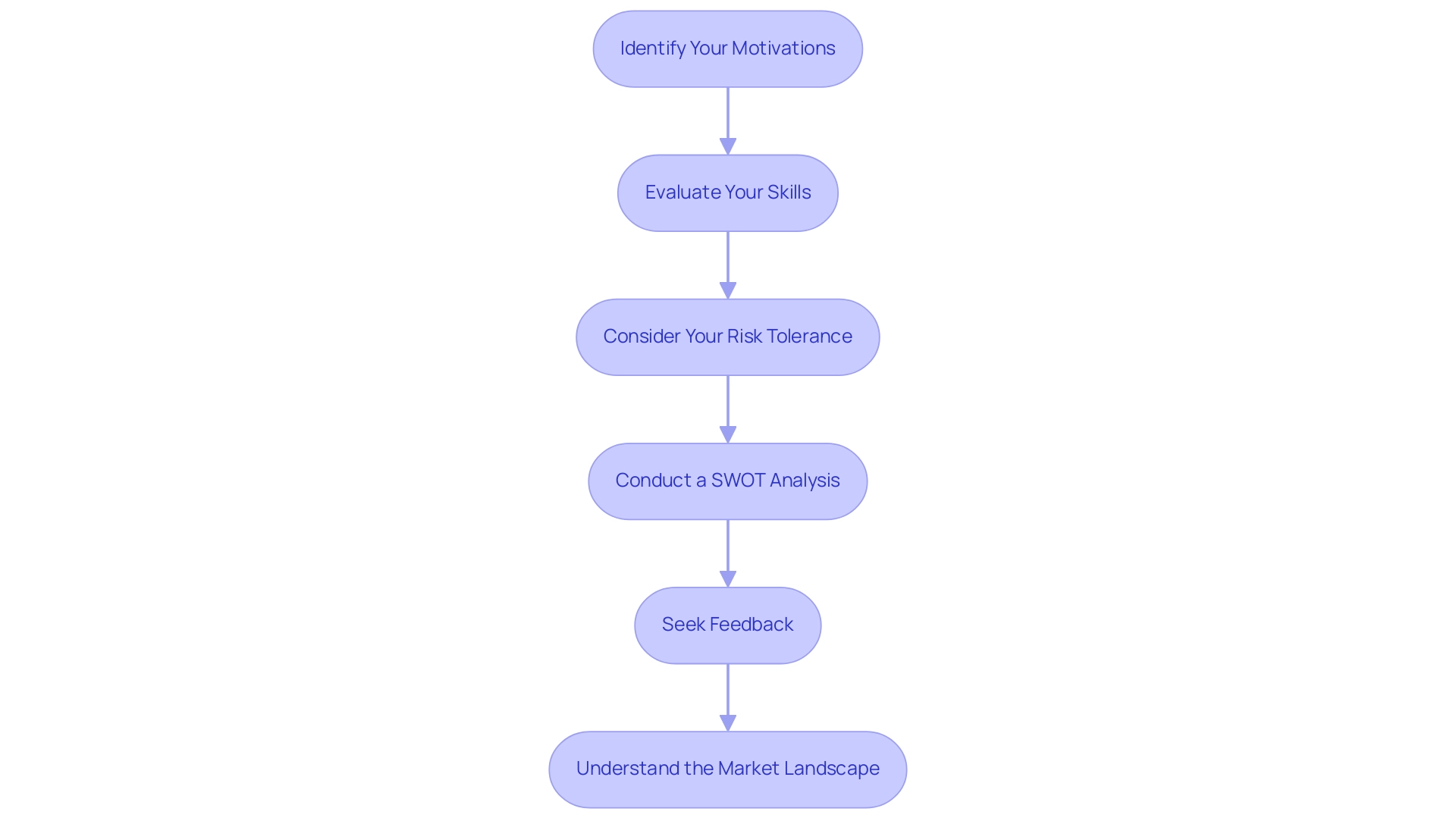
Planning Your Transition: Financial and Networking Strategies
To successfully navigate your transition into entrepreneurship, consider these essential steps:
- Create a Financial Plan: Begin by assessing your current financial situation. Create a comprehensive budget that includes both personal expenses and anticipated operational costs. It’s wise to set aside an emergency fund sufficient to cover at least 6-12 months of living expenses; this cushion will provide essential security during the early stages of your business. Interacting with a monetary consultant can also be beneficial, especially since self-funding through checking and savings accounts is a viable option. Advisors can guide your financial planning and help you make informed decisions.
- Explore Funding Options: Investigate various funding avenues available for your venture, including those offered by the U.S. Small Business Administration, which provides loans, grants, and other resources specifically designed to support small enterprises. Over 46% of small enterprise loans in 2019 were under $100,000, highlighting a reliance on smaller loan amounts that may impact profitability. Prepare a comprehensive plan that outlines your vision and financial projections to present to potential investors or lenders, including angel investors who may be part of your personal network.
- Build Your Network: Networking is critical in the entrepreneurial landscape. Actively engage with other entrepreneurs and industry professionals. Attend workshops, seminars, and networking events to forge connections with like-minded individuals who can offer support and insights that are invaluable as you embark on your journey. The collaborative spirit of small enterprises, which have created 62.7% of all new jobs in the U.S. since 1995, can inspire and motivate you in your endeavors.
- Seek Mentorship: Identify mentors who have successfully transitioned into entrepreneurship. Their firsthand experiences can offer you guidance and practical advice tailored to overcoming common challenges. Trevor Randall, President and CEO of Randall Wealth Management Group, emphasizes, “As a family business established over 30 years ago, I prioritize hands-on care and detailed investment research to ensure every portfolio decision is accurate.” This viewpoint can be invaluable as you navigate your own business journey.
- Join Entrepreneurial Groups: Engage with local or online entrepreneurial communities. These groups provide a platform to share resources, exchange ideas, and receive the support necessary to thrive during your transition. Small enterprises have represented 62.7% of all new jobs since 1995, highlighting the cooperative spirit that can drive you forward.
By establishing a solid financial foundation and cultivating a robust network, you will be well-prepared to tackle the complexities of entrepreneurship, especially in understanding how to prepare to leave a stable job for entrepreneurship, with confidence and control over your financial freedom. Additionally, for more insights and resources, download your free veteran entrepreneur® Program presentation here.
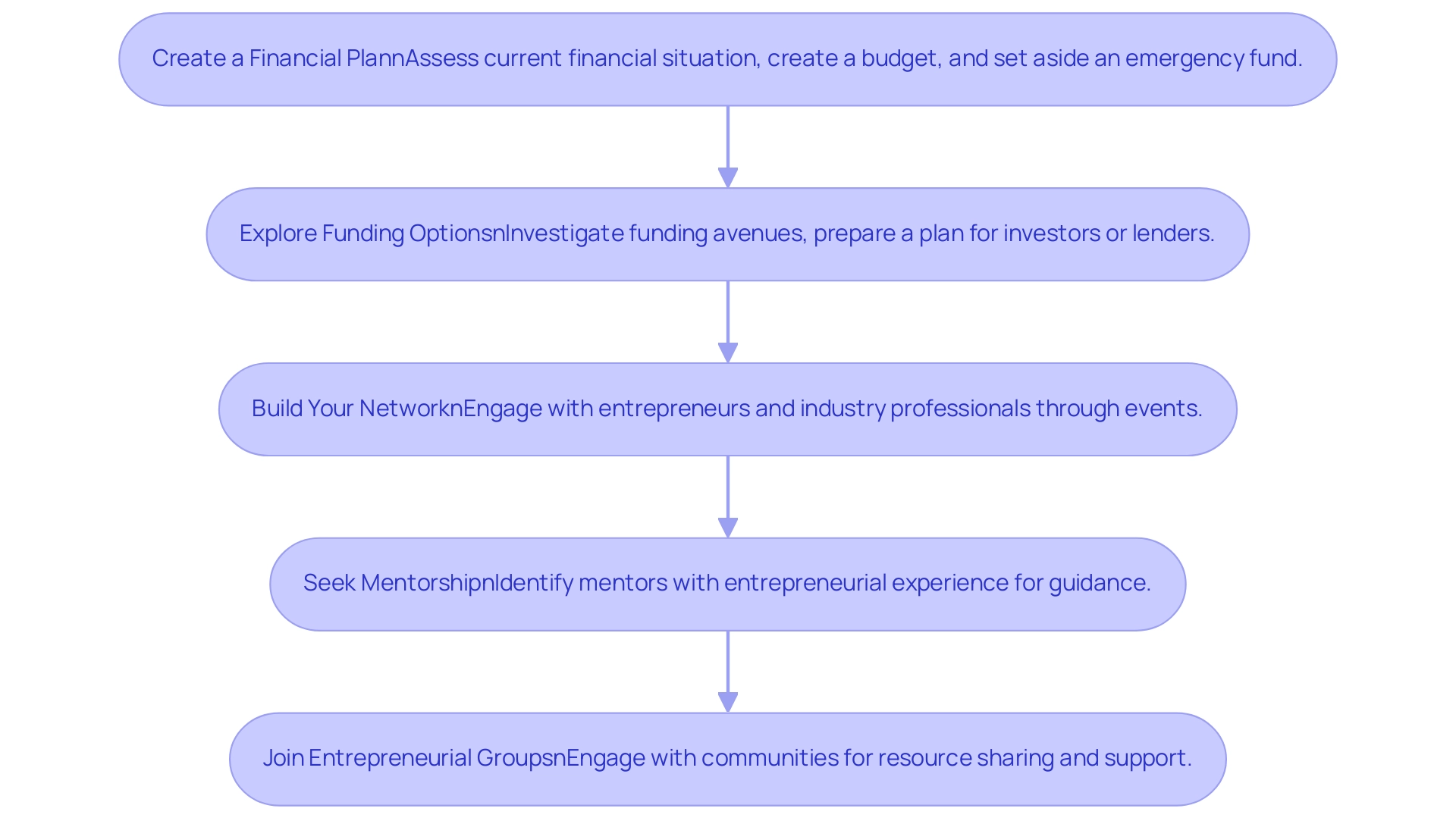
Validating Your Business Idea: Steps to Ensure Viability
To effectively validate your enterprise idea and confidently navigate the entrepreneurial landscape, consider the following essential steps:
-
Conduct Market Research: Begin by analyzing your target market, focusing on demographics, needs, and preferences. Employ surveys, interviews, and online tools to gather comprehensive data. This foundational step is crucial, especially as market research statistics for startups in 2024 indicate a growing reliance on data-driven insights, with a projected increase of 30% in startup utilization of market analytics tools to inform their strategies.
-
Identify Your Unique Value Proposition: Clearly articulate what distinguishes your enterprise from competitors. Understand the unique benefits you will provide to your customers. In the current market, companies that define their unique value propositions effectively are better positioned for success.
- Create a Minimum Viable Product (MVP): Develop a simplified version of your product or service to test with potential customers. This approach not only allows you to gather invaluable feedback but also minimizes initial investment risks. For instance, AI technology is projected to boost profits by 71% across various sectors, not just construction, underscoring the importance of integrating innovative solutions into your MVP.
-
Gather Feedback: Present your MVP to a select group of potential customers and solicit their feedback. This step is critical for refining your offering based on real-world responses. Remember, 84% of brands and marketers report positive outcomes from their PPC advertising campaigns, illustrating the importance of effective customer engagement strategies.
-
Test Pricing Strategies: Experiment with various pricing models to identify what resonates with your target audience and ensures profitability. This iterative process can help you find the sweet spot that appeals to your customers while sustaining your business.
By diligently validating your business idea through these steps, you can confidently enter the business landscape, showcasing how to prepare to leave a stable job for entrepreneurship with insights that demonstrate a genuine market need for your offering. The journey is backed by positive trends, such as the funding surge for female founders, where African-American and Latina startups raised $3.1 billion in 2020—though disparities still exist in funding access—indicating both the potential and challenges for diverse entrepreneurs in today’s market.
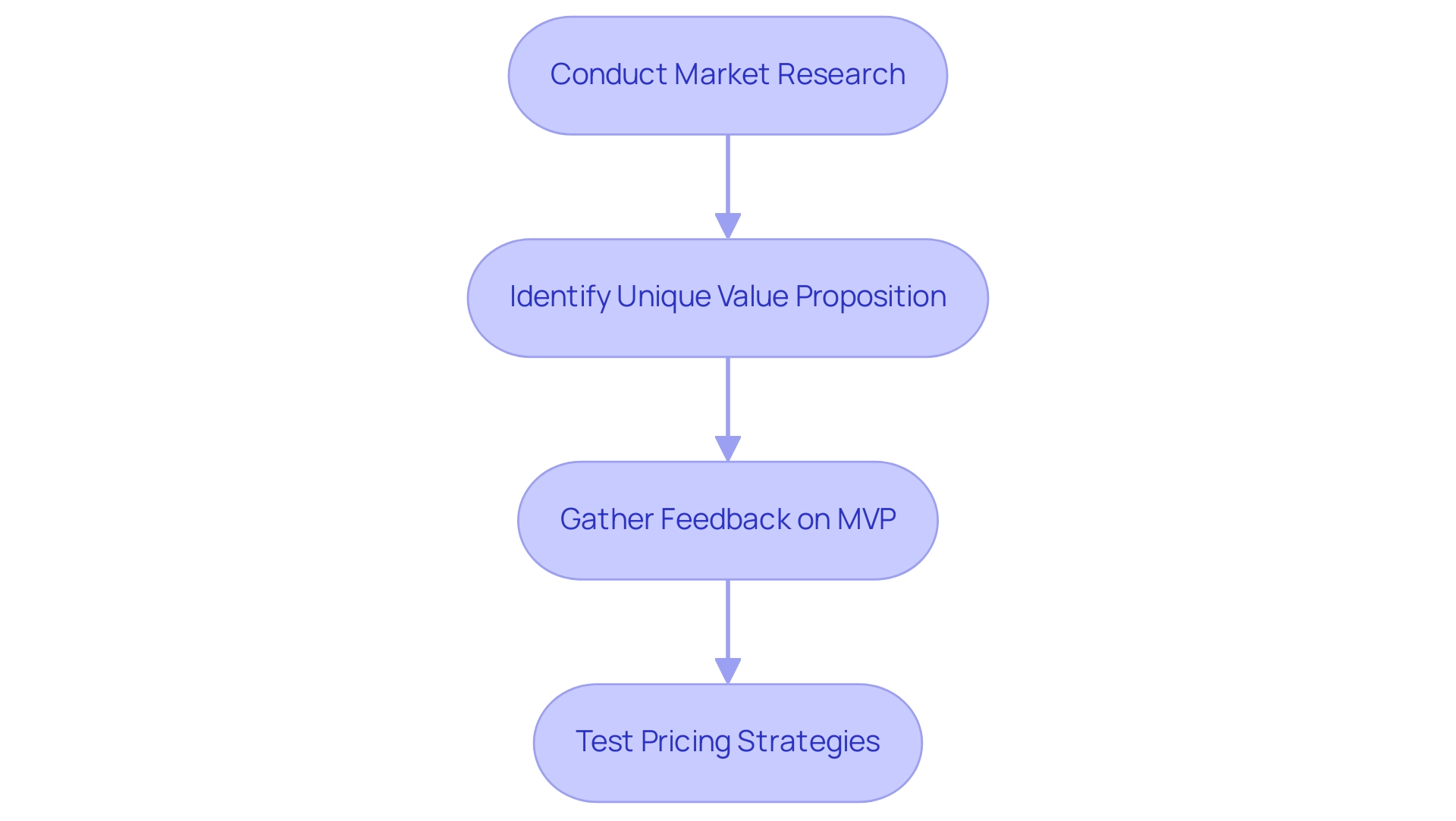
Navigating the Emotional Challenges of Leaving Your Job
Navigating the emotional challenges of how to prepare to leave a stable job for entrepreneurship is crucial for achieving long-term success. Here are several strategies to consider:
-
Acknowledge Your Feelings: It’s crucial to recognize that feelings of fear, anxiety, and doubt are common during this transition.
Allow yourself to fully experience these emotions without judgment, understanding that they are part of the journey.
-
Develop a Support System: Surrounding yourself with supportive friends, family, and mentors can make a significant difference.
These individuals should understand your business journey and provide encouragement, helping to alleviate feelings of isolation that many entrepreneurs face.
As highlighted by recent studies, a robust support system is linked to better mental health outcomes and resilience in the face of challenges.
In fact, the Endeavor Brazil report indicates that 68% of tech founders reported experiencing feelings of isolation, underscoring the need for connection and support.
-
Practice Self-Care: Engaging in self-care activities such as exercise, meditation, and pursuing hobbies that bring joy is vital.
Prioritizing your mental health during this transition is not just beneficial; it’s essential for maintaining the energy and focus needed to navigate the ups and downs of entrepreneurship.
-
Set Realistic Expectations: Entrepreneurship is inherently a journey filled with highs and lows.
It’s important to set achievable goals and to celebrate small wins along the way.
This mindset can help foster resilience and keep motivation high, especially during tough times.
The narrative surrounding entrepreneurs often portrays them as invincible, but acknowledging the reality of emotional struggles can foster a healthier perspective.
-
Seek Professional Help if Needed: If feelings of anxiety or depression become overwhelming, reaching out to a mental health professional can provide crucial guidance.
Remember, prioritizing your mental health is not a sign of weakness; it’s a proactive step towards building a sustainable business career.
By actively addressing these emotional aspects, you can better prepare for how to prepare to leave a stable job for entrepreneurship and navigate the challenges and opportunities that lie ahead.
Aaron Houghton emphasizes this approach with his mantra, MMC: Movement, Mindset, and Connection, which serves as a reminder of the importance of holistic well-being in your business journey.
Furthermore, fostering a culture of vulnerability among entrepreneurs can encourage open discussions about mental health, ultimately leading to stronger connections and support networks.
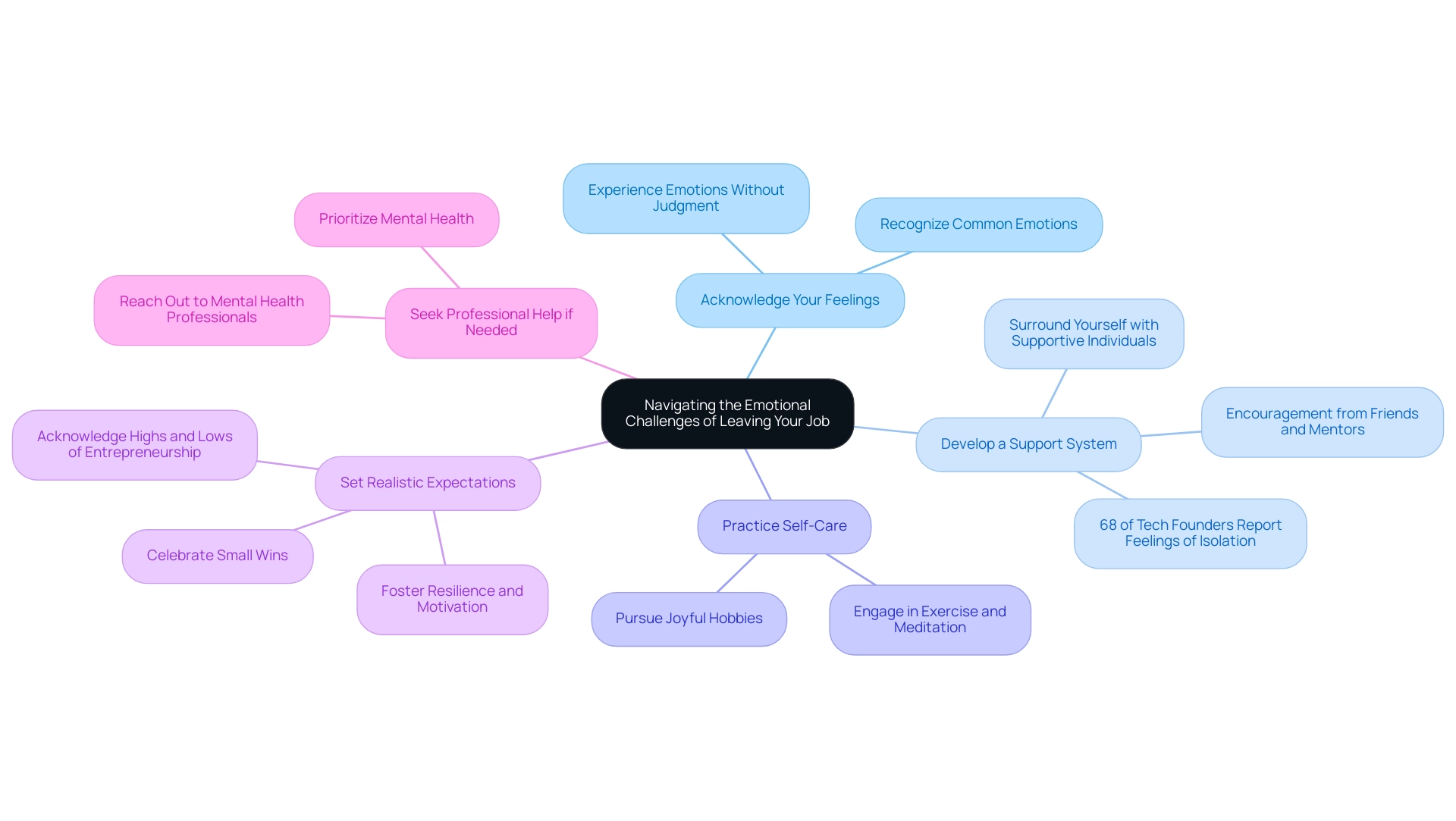
Leaving Gracefully: How to Maintain Professional Relationships
To navigate your departure from your current job with grace and prepare for your business journey towards financial freedom, consider the following essential guidelines:
- Communicate Professionally: Initiate a meeting with your supervisor to discuss your decision to leave. Approach this conversation with honesty and tact, clearly outlining your reasons for transitioning while remaining respectful of the organization. This professionalism not only preserves relationships but also sets a positive tone for your future endeavors.
- Provide Adequate Notice: Adhere to your company’s policy regarding notice periods. While two weeks is a common standard, it’s vital to review your contract for specific requirements that may apply to your role or industry in 2024. Providing notice demonstrates your commitment to professionalism, which can lead to positive references when considering how to prepare to leave a stable job for entrepreneurship.
- Document Your Transition Plan: Create a comprehensive transition plan that details your current projects and responsibilities. This proactive step ensures a seamless handover, minimizing disruption and demonstrating your commitment to your team’s success even after your departure. A well-documented plan can also highlight your transferable skills, valuable in your future entrepreneurial ventures.
- Express Gratitude: Take the time to thank your colleagues and supervisors for their support and the opportunities you’ve had during your tenure. A sincere message can leave a lasting positive impression and foster goodwill, which is essential for building a supportive network as you transition to business ownership.
- Stay Connected: After leaving, make an effort to maintain contact with your former colleagues. Building and nurturing your network can lead to future opportunities and collaborations that could be invaluable as you embark on your entrepreneurial journey.
Recognizing the impact of presenteeism related to stress, anxiety, and depression—costing between £590 million and £2.3 billion annually—underscores the importance of a healthy work environment during transitions. As Johnny C. Taylor, Jr., president and CEO of SHRM, emphasizes, ‘While the data shows overwhelmingly positive outcomes, it is still incredibly important that organizations have guidelines and policies in place – not to interfere with the relationships, but to protect employees from favoritism, retaliation, and incidents of sexual harassment.’ Organizations like Marsh McLennan have implemented digital tools aimed at enhancing employee well-being, which can support employees during transitions and lead to improved productivity and work satisfaction. By leaving your job on good terms, you not only set a positive tone for your next steps but also learn how to prepare to leave a stable job for entrepreneurship, preserving valuable professional relationships that can support your growth and ultimately lead to the financial freedom you seek.
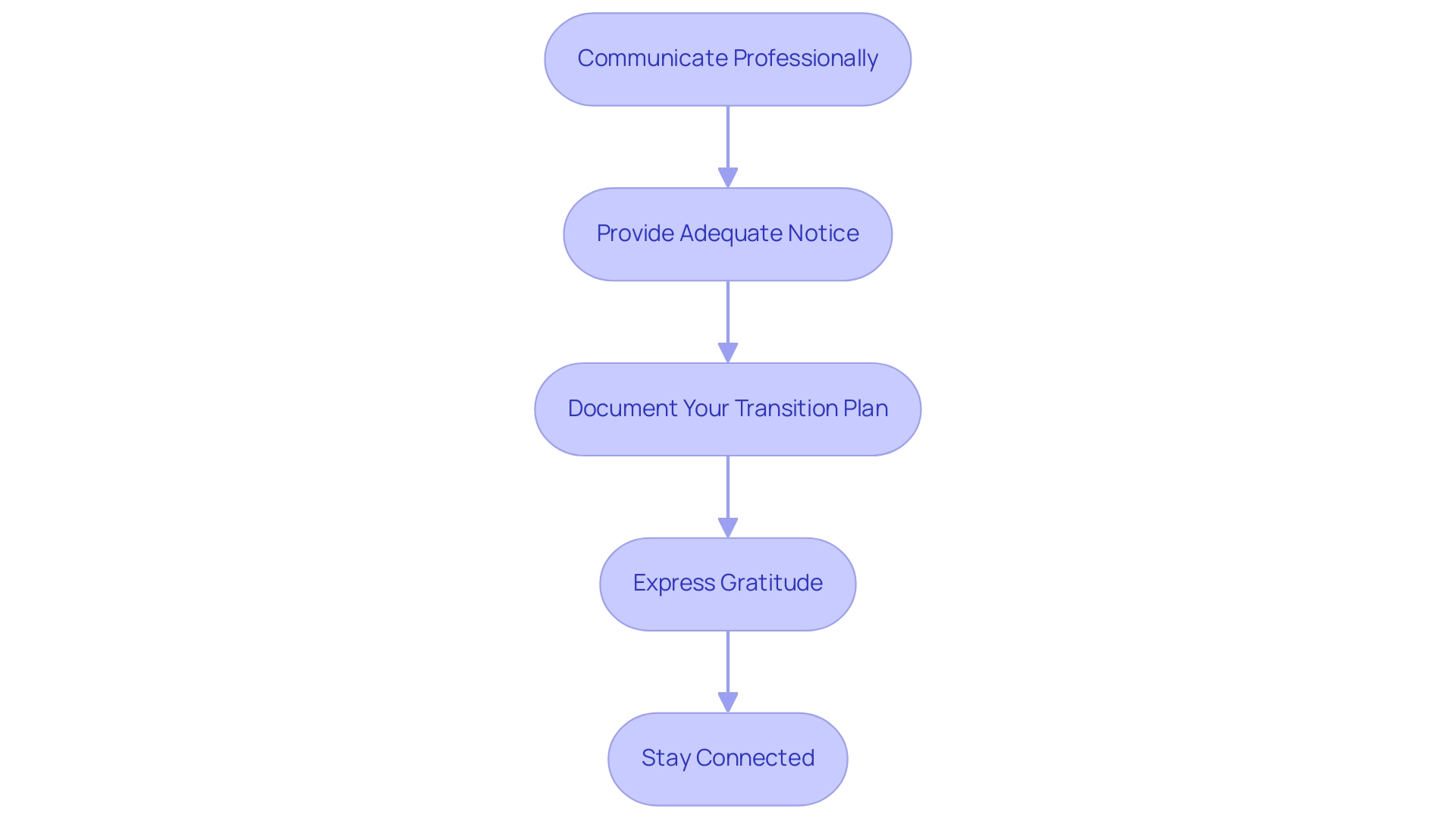
Conclusion
Embarking on the entrepreneurial journey is a multifaceted process that requires careful consideration and preparation. The steps outlined in this guide—from assessing personal motivations and skills to navigating the financial landscape and validating business ideas—are designed to equip aspiring entrepreneurs with the tools they need for success. Understanding one’s readiness, seeking mentorship, and building a strong support network are critical aspects that can significantly influence the outcome of this transition.
As individuals prepare to leave their stable jobs, it is essential to maintain professionalism and nurture relationships. Communicating openly with employers, providing adequate notice, and expressing gratitude can foster goodwill that may prove beneficial in the future. Additionally, recognizing and addressing the emotional challenges associated with this transition is vital for sustaining motivation and resilience.
Ultimately, entrepreneurship is not just about starting a business; it is about creating a fulfilling and sustainable career that aligns with personal values and aspirations. By taking a structured approach and embracing both the challenges and opportunities that lie ahead, aspiring entrepreneurs can confidently navigate this transformative journey toward financial independence and personal fulfillment. The path may be daunting, but with the right preparation and mindset, it can lead to a rewarding future in business ownership.
Frequently Asked Questions
What should I consider when assessing my readiness for entrepreneurship?
Reflect on your motivations for leaving a stable job, evaluate your skills, consider your risk tolerance, conduct a SWOT analysis, seek feedback from trusted colleagues or mentors, and understand the market landscape.
Why is it important to identify my motivations for becoming an entrepreneur?
Understanding your motivations is crucial as it provides clarity on your goals and can help sustain your passion throughout your entrepreneurial journey. Recent studies show that around 40% of traditionally employed Americans are considering entrepreneurship, with diverse motivations influencing this decision.
How can I evaluate my skills for entrepreneurship?
Compile a list of your strengths and transferable skills relevant to your new venture. Focus on key business skills such as leadership, problem-solving, and creativity that are essential for success.
What is risk tolerance, and why should I assess it?
Risk tolerance refers to your comfort level with taking risks and managing potential setbacks in entrepreneurship. Assessing it can guide your decision-making and preparation for the uncertainties of starting a business.
What is a SWOT analysis, and how can it help me?
A SWOT analysis involves identifying your Strengths, Weaknesses, Opportunities, and Threats. This framework provides a comprehensive view of your personal and market situation, helping you identify areas for growth and challenges to address.
How can feedback from others assist in my entrepreneurial journey?
Engaging with trusted colleagues or mentors for feedback on your aspirations can offer valuable perspectives and insights that enhance your self-assessment and readiness for entrepreneurship.
What should I understand about the market landscape before starting a business?
Recognize that advertising accounts for only 1% of the average business’s revenue, with 55% utilizing social media for advertising. This knowledge is crucial for planning your marketing strategies and reaching your target audience effectively.
What financial steps should I take before transitioning to entrepreneurship?
Create a comprehensive budget, assess your current financial situation, set aside an emergency fund for at least 6-12 months of living expenses, and consider consulting with a financial advisor for guidance.
What funding options are available for new ventures?
Explore funding avenues such as loans and grants from the U.S. Small Business Administration. Prepare a comprehensive plan outlining your vision and financial projections for potential investors or lenders.
How can networking benefit my entrepreneurial journey?
Networking allows you to connect with other entrepreneurs and industry professionals, providing support, insights, and motivation. Engaging in workshops, seminars, and networking events can enhance your entrepreneurial experience.
Why is seeking mentorship important in entrepreneurship?
Mentors who have successfully transitioned into entrepreneurship can provide guidance and practical advice tailored to overcoming common challenges, helping you navigate your business journey more effectively.
How can I engage with entrepreneurial groups?
Join local or online entrepreneurial communities to share resources, exchange ideas, and receive support necessary for thriving during your transition into entrepreneurship.


